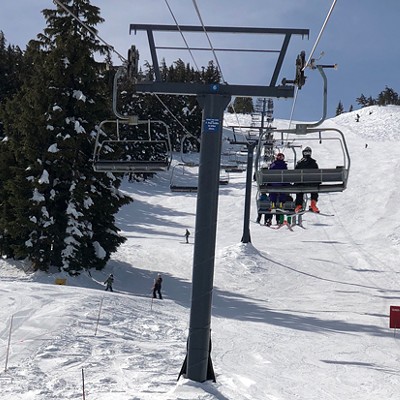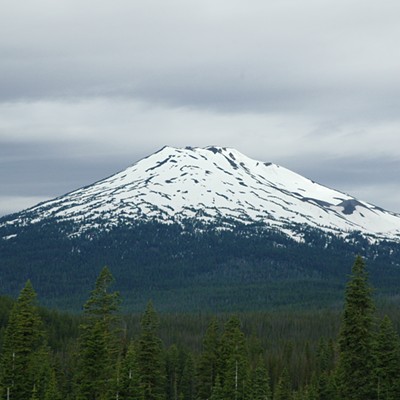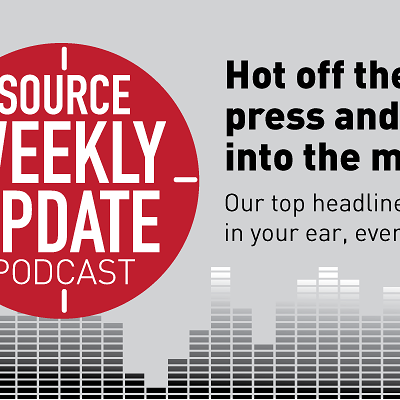It was a beautifully terrible day. There's something about stormy days on the mountain; you can't hear yourself speak up against the wind. The snow is swirling around you madly. The surface of the slopes disappears with the blowing layer of wind and snow. Vertigo comes and goes. You can barely feel your fingers—it's nicer when they go numb. All the noise actually creates this stillness, in which the only thing you can feel and hear is your own breathing.
I love stormy days. They push me, challenge me to find my center. But on this one, I didn't know the day would end in a way that challenged my very self, identity and career. Our coaches at the U.S. Nationals Grand Slalom race told us the race would run no matter what, so we knew it was going to be a crazy weather day. The first gates were blowing downhill in the tail wind. I was cold down to the bone. The sleet had piled up overnight but was slipped off the icy GS course. I was only there racing for the hell of it, for fun.
It had been two years since my last race in GS, but I was excited to give it a shot again. After all, it used to be my best event. I remember taking off my outer layer and immediately freezing my buns off, clicking into my skis and mentally preparing for a wild ride.
The first few gates were fast—very fast for a GS. The tail wind pushed me out of the start...I barely had to pole at all. By the third gate I was hauling, arcing some nice turns on the top flat. Then, at what I thought was the sixth gate, I pressured my skis for a right footer on the backside of a roll, and they slipped out from under me on the ice. I was sliding on my left hip, thinking I could stand back up and still make the next gate. A silly hip-check at high speeds can be fun to pull off.
But, now, I know better.
Before I was fully back on my feet (my weight was transferred, but I had yet to stand completely back upright) I hit a pile of new snow with my right outside edge. It twisted and jerked my knee out with incredible force. I'm not even sure what the crash was like...all that remained was pain. Excruciating pain. And that's all that existed for the following hour. I don't even remember thinking about what was wrong, where my friends and family were, if I'd ever ski again—just pain and the accompanying aspects: moving into a sled, wailing uninhibitedly, Micum (my physio) consoling me on my sled ride, shivering, shaking, pain.
In a sense, it was probably the most present I have ever been for such a span of time. I was forced to be with the pain, and although I was not "OK" with it (all I wanted was for it to be gone), I was at least with it. I could barely breathe. I was choking on my sobs and violently shaking throughout my entire being. The pain penetrated to my very core. I have experienced many kinds of pain before—from dislocated shoulders to bone-deep lacerations, from a broken heart to a shattered pelvis—but all have paled in comparison to this. It was awful, horrific, unbelievable, and it was terrifyingly real.
Eventually, I was loaded up with Fentanyl, yet even a normally large dose didn't numb me enough. I began to care about other aspects of my reality, and that's when I realized how all-encompassing the pain was. It was almost like, when I was living in the pain, I was in another world. A hell of sorts. A world where nothing good exists. I hope I'll never have to return to that place.
The first rational thoughts I remember were the appreciation for, and comfort in, having my best friends, my parents and my partner by my side. They were there when it transitioned from my pain cave to my bad version of reality. The ambulance ride was the first time I began considering my future: what was actually wrong with my knee? I knew it was something awful, but I had no idea about the extent of my injury yet. Would I ski again? Would I walk again? What would I do if I couldn't get back to these physical capabilities? I thought about university, about my degree, grad school.
I thought about whether, if I could ski again, I would even want to. To expose myself to the potential of experiencing it all again seemed out of the question. Thankfully, one of my best friends (and pro skier), Leanne was there providing some rational insight.
"Wait," she said. "See how you feel. Now is a terrible time to make decisions." She was right. Any time over the next six weeks would have been a terrible time to make any sort of life decisions, so I didn't let myself. I told myself, "Until you're completely out of the pain, no big decisions."
And fuck. Those next six weeks were so hard. When I learned, the night of my accident, the extent of my injury, I knew it was going to be a long, bumpy road. But I didn't really know—you never really do until you're in it. Four days later I went under the knife in Vail, Colo. I woke up after surgery, back in that pain place, sobbing and restless.
That first night was hell. I barely slept, which is pretty astonishing considering the amount of morphine dripped into my veins all night. I had horrible visions and I vaguely remember writing about the pain in my journal, but I was mostly numbing myself with pain medication and not feeling like myself for what felt like a ridiculously long span of time.
Aside from all the misery, there was love. So much love. Nothing felt like enough at the time, but now I look back and see how lovingly I was cared for.
tweet this
I cried in every therapy session over those first four weeks. I would even cry in the car on the way to therapy, foreshadowing the pain it would cause. But I knew I had to do it to get back to skiing and to living how I wanted. That first month I was burdened with intense anxiety—fear of physical therapy and the pain, fear of my future, fear, even, of the present. I got to know my darkest self and, although there were glimpses of light, I didn't enjoy much of anything. I took so much Vicodin, Oxycontin, CBD-this and Arnica-that, attempting to soothe the discomfort. But I just had to ride it out. Thankfully, I didn't know that beforehand.
Aside from all the misery, there was love. So much love. Nothing felt like enough at the time, but now I look back and see how lovingly I was cared for. Tommy (Ford) flew with me to Colorado for the surgery. Both parents came out to Vail to help me during my surgery and first week of recovery. My mum and I slept in the same bed for the first time since I had had meningitis, years ago. My friend Elle moved to Bend to help me for a few weeks while my roommate Kelly made me insanely delicious meals and brought me breakfast in bed every morning. She rubbed my feet at night and slept with me on the bad nights while her dog cuddled me—a rarity for him. Kyle, our other roommate, crafted bouquets for me and filled the house with spring colors and scents. My dad brought dinner over countless nights and helped with my at-home therapy every single day. My therapist Ellie even came to my house on the weekends. Looking back on it all, it was magic. I was surrounded by the most wonderful people, but I couldn't see that clearly at the time.
I was always freezing cold—shivering under all the covers, obsessed with my heating mat and constantly taking scalding-hot baths. I lost 15 pounds over the first few weeks, mostly from my loss of appetite with the pain meds but partly due to the cold and anxiety as well. Thinking clearly was a luxury, but it began happening more regularly about a month after surgery. I embraced these times to write or do homework; I took a few online classes to dedicate my mind to useful thinking. Eventually, I submerged from the cloud of drugged-up obscurity and came back to myself.
I got inspired by my classes—to create, to dream, to keep moving. I adopted an anti-inflammatory diet (no gluten, dairy, alcohol, night-shade vegetables, fried food or sugar) for a while and learned how to cook with fresh, whole foods. I spent countless hours in therapy (a regimen that has not come to an end), working on my knee while tending to the rest of my body.
Everybody thinks you'll have all this extra time when you get injured, but so much time is spent doing the simple things: getting from place to place, doing physical therapy, taking a shower, trying to get enough sleep, countering countless wakeful nights. There have been days over the past six months where I'll leave the Center of Excellence in Park City and realize I spent nine hours in the gym that day. Then I have to head home to rest, elevate, compress, ice. It's never ending.
But I've made the time to take a few classes, to do some drawing and lots of writing, to read books and magazines. My world seems to have expanded during this difficult phase of healing, despite shrinking down so small at times. I am seeing everything just a little bit differently: the light peeking through the leaves, the old man on his bicycle, the scars that adorn my changing body. I understand things differently, mostly in the sense that I understand very little, and that's OK.
I recognize and appreciate the small victories. I notice elements of the slow progression that accompany any major injury: the pain of descending stairs slowly dissipating over an eight-week span. Some things happen fast (not many) and these help me to understand my high expectations (when I rarely fulfill them) and how to keep them at bay.
I've learned how to be gentle with myself, how to be kind. I know it will take effort to carry this through the winter, but I know, for my sanity and well-being, this is something incredibly necessary for me to continue to work on. I am currently starting to race again on the World Cup circuit, and I am allowing myself to get excited, but making sure I return to racing slowly, with no expectations.
I have worked my ass off, have sacrificed so much, and have been through emotional hell for my sport, but even if it doesn't work out—if I'm unable to race as one of the best in the world ever again—it will all have been worth it. I'm better from all of this. I am me, and I'm getting to know that person and am learning what really makes me happy and realizing that what it all comes down to, really, is love. So, if anything, out of this process I will take those lessons and begin with loving myself.
And maybe out of that love will grow something wonderful.
Laurenne Ross has competed in four Alpine World Ski Championships and raced in the 2014 Olympic Winter Games in Sochi, Russia. She's been on two World Cup podiums and has been ranked one of the Top-10 speed skiers in the world. Follow her journey at laurenneross.com.






















